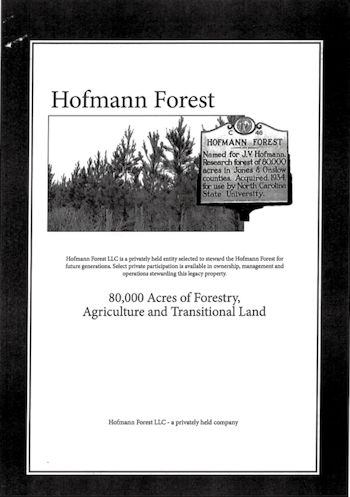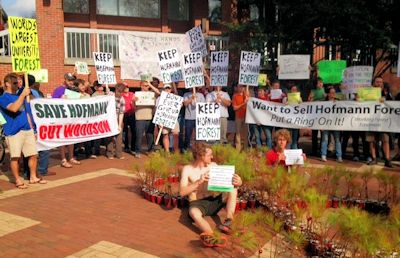As the clock slowly ticks toward the June 30 deadline for the sale of the Hofmann Forest in Jones and Onslow counties to an Illinois-based agricultural company, much remains shrouded in mystery in what appears to be an increasingly bitter battle.
There has been little or nothing about the pending sale in the media since early in December, when opponents of the sale appealed a Wake County Superior Court’s decision to grant motion filed by the foundation at N.C. State University that owns the forest to dismiss a lawsuit to require the state to do an environmental assessment before selling the 79,000-acre research forest for about $150 million.
Supporter Spotlight
 This 22-page prospectus raised questions about what the new owner plans to do with the Hofmann Forest. This 22-page prospectus raised questions about what the new owner plans to do with the Hofmann Forest. |
An “investors’ prospectus” that surfaced late last year raised numerous questions about what the new owners, Hofmann Forest LLC, will do with the land. The document outlines commercial and residential development on thousands of acres, calling into question assurances from the prospective new owner that it would maintain most of the forest for research and not convert it to agricultural, commercial and residential uses.
Coastal Review Online attempted recently to contact Jerry Walker, head of Hofmann Forest LLC. He didn’t return phone calls. We also contacted Tom Percival, a Lumberton-based forestry consultant who has served as Walker’s spokesman. He said he was “too busy” to answer questions and asked that he be emailed contact information. We did and are still awaiting the answers.
Samuel Johnson, the lawyer listed on the sale contract as the contact for the purchaser, referred us to Katherine Murphy of the state Attorney General’s office. She didn’t return our phone calls.
The N.C. Coastal Federation is also waiting for the Army Corps of Engineers to respond to a request for information about more than 5,500 acres of Hofmann land that appear to already have been cleared, possibly for conversion to agricultural use.
The almost total lack of information is just one of the things that deeply concerns Fred Cubbage, a lead plaintiff in the lawsuit to stop the sale. Cubbage, who is a professor in the Department of Forestry at NCSU and headed that department from 1994-2004, said the entire sale has been shrouded in secrecy from the beginning.
Supporter Spotlight
“There have been closed meetings, no minutes, votes behind closed doors, no rules and no input,” he said. “There could have been other bidders, some who I believe would have offered more money and more assurances that the forest would remain in intact, but that was not allowed. We know more about the NSA than we do about this sale.”
Cubbage said he is left with the conclusion that the sale to Hofmann Forest LLC has been a foregone conclusion that goes back quite a while. In fact, he said, the sale has been essentially a done deal since 2012.
At that time, the university was looking for a new dean of the College of Natural Resources. One applicant for the job, Cubbage said, was asked if he would support sale of the forest, and when that applicant said he wouldn’t, it was basically the end of the interview, Cubbage said.
Mary Watzin got the October 2012, and in January 2013 sent a letter notifying alumni of the natural resources college that the sale had been unanimously recommended by NCSU’s Natural Resources Foundation Board of Directors. The foundation manages the forest for the college.
“I also want to reassure you that any sale of the Hofmann will be consistent with the values of the college, which include retaining the name in recognition of the legacy of the forest to the college,” she wrote. “The goal is to sell the property as a working forest. The college hopes to retain access to the property by faculty and students for teaching and research. My commitment to forestry education, research and outreach as core elements of the programming of the CNR is strong.
“In deciding about the future of the Hofmann, the foundation (and the college) has considered which options would provide the greatest good for the largest number of CNR students, our faculty and staff, and our professions, over the long term,” Watzin continued in her letter. “The college is currently experiencing significant growth and has strong ambitions. Keeping current programs strong and leveraging new opportunities for the College will only be possible with additional cash flow. A more diversified portfolio of investment could provide a higher and more consistent level of support to the college.”
Hofmann Forest LLC filed incorporation documents with the N.C. Secretary of State’s office on Jan. 30, two weeks after Watzin sent out the letter.
 Fred Cubbage Fred Cubbage |
 Mary Watzin Mary Watzin |
Hofmann is named for the founder of the N.C. State forestry program, Julius “Doc” Hofmann. He started buying the land for it in the mid-1930s for research and to provide income for the forestry program mainly through timber harvesting. The land was owned for decades by a private foundation, which gifted it to the university’s Endowment Fund. There, it continued to generate revenue from timber sales for the College of Natural Resources.
Todd Miller, executive director of the N.C. Coastal Federation, filed his request with the Corps on Nov. 15, one day after the investor prospectus surfaced and appeared to call into question assurances by Hofmann Forest LLC that if it purchases the forest from the fund, it will maintain most of the forest for research. In his request, Miller said the document states that, “As of Feb. 2013, 5,502 acres in the Forest have been clear cut and/or been prepped for reforestation. These areas could easily be converted to agricultural uses without having to go through the Corps of Engineers.”
The prospectus also mentioned developing a tract large enough for up to 2 million square feet of commercial space and more than 10,500 homes, including a golf community, near Jacksonville, and conversion of as much as 50,000 acres from forest to farms. It notes the “virgin organic soil” for farming if the trees are removed and estimates the value of potentially converted farmland at $5,500 to $6,500 an acre. It also notes the potential for mineral excavation and gas exploration. The prospectus also mentions the prospect of military easements and suggests that the Pentagon is willing to pay about $50 million for a 50-year lease.
Although Percival immediately said the prospectus was put together months ago and the focus has since shifted to preserving the forest, Miller and others are skeptical. Miller noted that February 2013, the date on a map in the prospectus, is “not that long ago,” and he and others pointed out that the document was put together to attract investors, who most likely would expect something from their investments other than ownership of forestland.
Cubbage, in the interview last week, said that despite his love of the university – he has worked there for two decades and two of his children have degrees from NCSU – he thinks the sale of the forest, especially without ironclad protections against development, is a betrayal of the university’s longstanding commitment to sustainability. In short, he said, the university has sold out what it has claimed to be a core principal for cash, and not even enough of it.
And despite the buyer’s assurances that the prospectus does not represent a true statement of the purpose of the purchase, Cubbage is far from convinced. In fact, he called it “ridiculous.”
The university, he said, apparently thinks it’s not making enough money growing and selling trees from the property and the school doesn’t even owe any money for the property or pay any taxes on it.
 Students at N.C. State University protest the potential sale of the forest. Photo: WNCT-TV Students at N.C. State University protest the potential sale of the forest. Photo: WNCT-TV |
A buyer, he said, can’t possibly spend $150 million for the forest, pay taxes on it and satisfy investors, without eventually finding more ways to profit from the venture. And those ways – conversion to agriculture and some commercial development – have been outlined in the prospectus.
In the end, he said, he believes much of the forest will be ditched and drained.
Nor does Cubbage believe the university’s contention, expressed in Watzin’s letter to the college alumni, that the forest is not used much. Every forestry student, he said, takes classes that use the forest.
The bottom line, according to Cubbage, is that the ecology of the area will eventually suffer and the university’s mission will be compromised.
But Cubbage has not lost all hope yet. He thinks the plaintiffs in the case stand a good chance of winning the appeal.
In her ruling, the judge, he said, did not make any pronouncement on the wisdom of the sale or on the merits of proceeding without an environmental assessment under the State Environmental Protection Act. Rather, her verdict was based on whether the plaintiffs were entitled to halt the sale or force the university to comply with the letter of the law. He thinks the plaintiffs – foresters and conservationists – have a good chance of convincing the higher court that they have such standing, given the great value of the land as wildlife habitat and as a “sponge” that soaks up pollutants before they can reach the headwaters of major Eastern N.C. rivers, including the White Oak, Trent and New.
“If we don’t have standing, who in North Carolina does?” he asked.
He also thinks that the appellants can show that the land is public, not private, as the university has contended. While it’s true that the land is owned by the foundation, he said, the university has admitted that no taxes are being paid on it.







